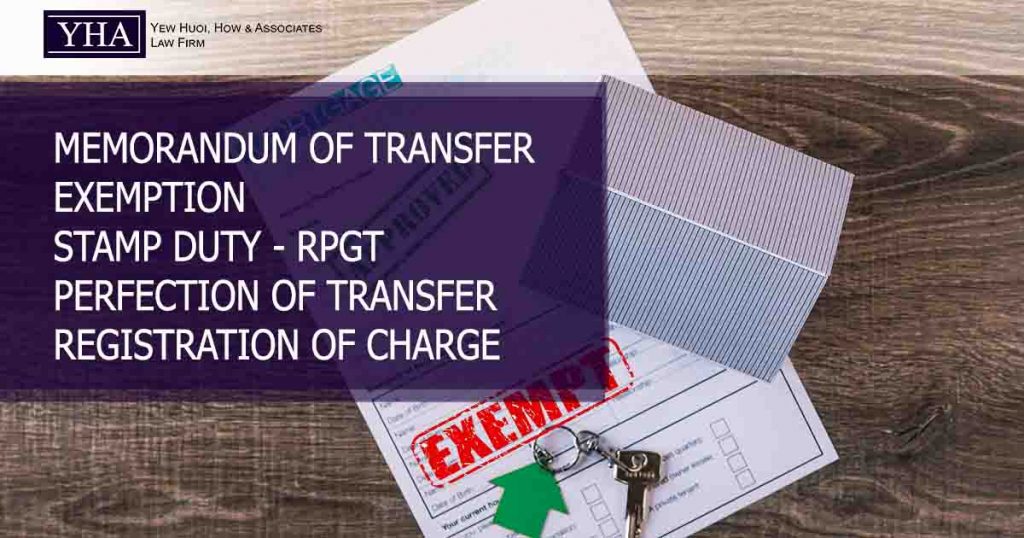Memorandum of Transfer (“MOT”)
- MOT is a legal document prescribed by the National Land Code 1965, which is used to effect the transfer of the ownership of the property, once the individual title / strata title is issued, from the developer to the purchaser.
- For an MOT to be legally effective, the document must be stamped and adjudicated at the Inland Revenue Board and the stamp duty paid.
Exemption on Stamp Duty
- The government under its recent short-term economic recovery plan (“PENJANA”) has reintroduced the Home Ownership Campaign 2020 (“HOC 2020”) which offered significant reductions to the stamp duty payable for qualified home buyers.
- Under HOC 2020, Malaysian home buyers who sign and stamp their Sale and Purchase Agreement (“SPA”) from 1st June 2020 to 31st December 2021 may receive full stamp duty exemption on their MOTs and loan agreements depending on property value.
- Take note: this is only applicable to residential properties that fall within the range from RM300k to RM2.5 mil.
- Take note: stamp duty of MOT will only be exempted for the first RM1 mil of the property.
- For the remaining, RM3 will be imposed for every RM100.
- If you buy property within RM1 mil, you will be exempted from stamp duty for both MOT and loan agreements.
Exemption on RPGT
- When you are selling a property, you are required to pay Real Property Gain Tax (“RPGT”) based on the gains from the disposal of the property:-
| Disposal | Malaysians | Foreigners | Companies |
| 1st year | 30% | 30% | 30% |
| 2nd year | 30% | 30% | 30% |
| 3rd year | 30% | 30% | 30% |
| 4th year | 20% | 30% | 20% |
| 5th year | 15% | 30% | 15% |
| 6th year and thereafter | 5% | 10% | 10% |
- In PENJANA plan, RPGT has been exempted for the disposal of properties. However, it must fall under the following requirements:-
- This exemption is only applicable to residential property.
- The transaction shall be carried out from 1st June 2020 to 31st December 2021.
- This exemption is only limited to the disposal of three units of residential homes per individual.
Stamp Duty Exemptions for Transfers between Loved Ones
- Transfers of ownership between family members and loved ones would come under “love and affection”
- Love and affection transaction is subject to certain exemptions on the stamp duty.
- This is only applicable to transfers between husband and wife, and parent and child.
- Transfers between spouses will be exempted from stamp duty, while between parent and child, there is a 50% exemption.
Perfection of Transfer (“POT”)
- POT is the process of the changing of the name on the title from the developer’s name to the current owner’s name.
- Most of the time, the property title is still under a Master Title when a person buys an under-construction house from the developer.
- Generally, Master Title refers to the whole piece of land, which including building lots or parcel lots that haven’t divided into individual building lot or parcel lot. In other words, all properties will be put together in one big plan.
- Therefore, it is the developer’s responsibility to subdivide the big plan into an individual share of the property and submit it to the Land Office for their approval.
- Upon approval by the Land Office, each unit of property will now has its Individual or Strata Title and the previous Master Title will be revoked to the Land Office.
- When an Individual Title or Strata Title has been issued at a later date, a POT process is required to complete ownership procedure from developer to the purchaser.
Perfection of Charge (“POC”)
- If the purchaser obtains a loan to purchase the property, the purchaser shall charge the property to the bank by way of POC.
- Charge is a common form of security registered in favour of the financial institution in exchange for the granting of a loan facility to the purchaser in financing the purchase of property.
Why do you have to appoint a conveyancing lawyer to do POT and POC?
- To act on your behalf to communicate with developer’s solicitor as well as to transact with the various government agencies.
- A property transaction has a complex legal procedure, a conveyancing lawyer would be able to guide, prepare and explain at every step to you

